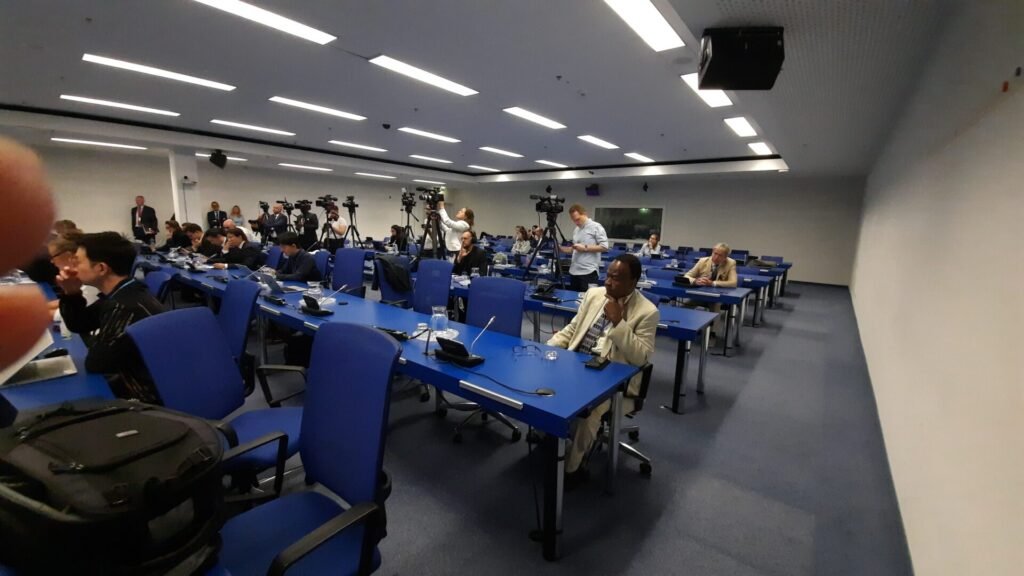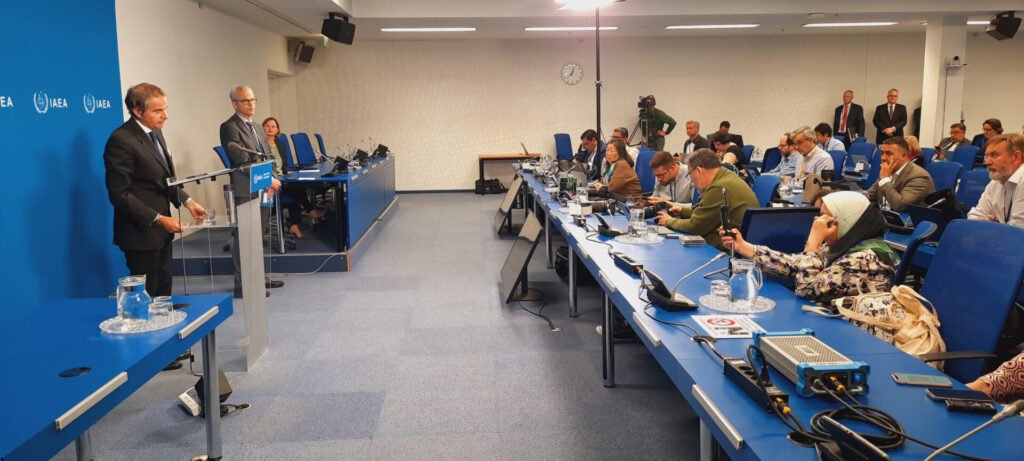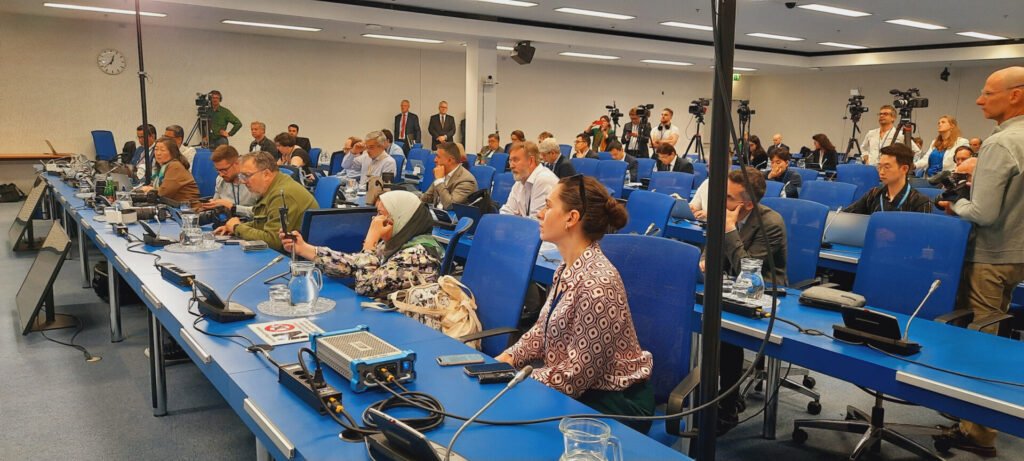Context and Purpose of the Speech
The address delivered by the IAEA Director General during the Board of Governors meeting on June 9, 2025, holds significant importance within the framework of global nuclear governance. The International Atomic Energy Agency (IAEA) plays a pivotal role in ensuring the safe and secure use of nuclear technology, fostering cooperation among member states, and promoting the principles of non-proliferation. This biennial gathering serves as a key platform for member states to deliberate on the agency’s operational strategies, review its progress, and set priorities for future actions in the evolving nuclear landscape.
The significance of this meeting cannot be overstated, as it provides a vital forum for discussing pressing issues related to global nuclear safety and security. In an era marked by technological advancements and geopolitical tensions, the IAEA is confronted with contemporary challenges that necessitate robust responses from its member states. Issues such as nuclear disarmament, the safeguarding of nuclear materials, and the management of nuclear waste are essential topics that the agency must address diligently. The latest developments in nuclear technology also present both opportunities and risks, which require careful assessment and international cooperation.
Furthermore, the Director General’s remarks are crucial for setting the tone for future discussions and providing direction for the IAEA’s initiatives. By articulating the organization’s vision and goals, the Director underscores the collective responsibilities of member states towards achieving a safer world. This address not only sheds light on the IAEA’s ongoing efforts but also highlights the importance of continued collaboration and commitment among nations in facing global nuclear challenges. In this context, the insights presented during the speech are expected to guide the decisions made during the meeting and inform future policy development within the agency.
Major Themes and Messages
On June 9, 2025, the Director General of the International Atomic Energy Agency (IAEA) addressed the Board of Governors with a focus on several pivotal themes central to the agency’s mission. Foremost among these was the urgent need for reinforced nuclear non-proliferation efforts. The Director General stressed that strengthening frameworks to prevent the spread of nuclear weapons remains a paramount objective. The risks associated with nuclear proliferation are multifaceted, extending beyond borders and impacting global security. The speech advocated for renewed dialogues and partnerships among member states to foster a more secure world.
Advancements in safety protocols also featured prominently in the address. The Director General outlined the ongoing initiatives aimed at enhancing safety conditions in nuclear facilities across the globe. He underscored that with the increasing complexity of nuclear operations, rigorous safety protocols must evolve continuously. The emphasis was placed on the necessity of adopting the latest technological advancements and innovative strategies to mitigate risks, which is essential not only for the security of nuclear plants but also for the protection of nearby populations and ecosystems.
In addition to non-proliferation and safety, the promotion of peaceful nuclear technology emerged as a key message. The Director General highlighted various programs that utilize nuclear technology for beneficial purposes, such as in medicine and energy production. By showcasing successful case studies, he illustrated how peaceful applications can significantly improve quality of life and contribute to sustainable development goals. Furthermore, the Director General’s commentary included reflections on ongoing global situations impacting nuclear governance, recognizing that geopolitical dynamics play a crucial role in shaping the discourse surrounding nuclear energy and its regulation.
International Collaborations and Initiatives
In the address delivered by the IAEA Director General to the Board of Governors on June 9, 2025, a significant emphasis was placed on the importance of international collaborations and initiatives aimed at enhancing nuclear safety and development worldwide. The Director General highlighted that partnerships with member states remain a cornerstone of the IAEA’s strategy, fostering an environment of trust and mutual support which is essential for promoting peaceful uses of nuclear energy.
Collaboration with various national governments has led to numerous successful initiatives designed to tackle global challenges, such as climate change and energy security. For instance, the agency has actively engaged with member states to propel the adoption of new technologies that not only enhance nuclear safety but also optimize energy production. Such collaborative efforts are not solely limited to technology transfer; they encompass sharing knowledge, best practices, and building capacity in emerging nuclear countries.
In alignment with these efforts, the IAEA has also forged alliances with other international organizations, such as the United Nations, the World Health Organization, and the International Renewable Energy Agency. These partnerships have resulted in impactful projects that address pressing issues like the sustainable development of nuclear energy and the management of radioactive waste. By working together, these organizations are able to create a comprehensive framework that aligns nuclear initiatives with broader global objectives.
The Director General noted that these cooperative strategies are crucial not just for improving national capabilities, but also for shaping global nuclear policies that prioritize safety and security. The benefits derived from such collaborations are manifold, as they not only facilitate shared learning but also bolster the global nuclear community’s collective strength in addressing future challenges. This concerted approach ultimately reinforces the IAEA’s mission to ensure the safe and peaceful use of nuclear technology across the globe.
Future Outlook and Recommendations
In the wake of the IAEA Director General’s address to the Board of Governors on June 9, 2025, it is evident that the future of nuclear governance will hinge upon adaptive strategies that respond to both emerging challenges and opportunities in the nuclear sector. The Director General emphasized the need for member states to strengthen their regulatory frameworks, ensuring they are both robust and adaptable to change. By doing so, countries will be better positioned to oversee nuclear activities effectively while fostering transparent and collaborative international engagement.
One of the foremost recommendations highlighted by the Director General involves enhancing safety measures across nuclear installations. The IAEA advocates for the implementation of advanced safety protocols and regular assessments to mitigate the risks associated with nuclear operations. As new technologies develop, the IAEA encourages member states to invest in continuing education and training for personnel, thus ensuring that scientists and engineers are well-versed in contemporary safety measures and best practices.
Furthermore, addressing environmental concerns stands at the forefront of the IAEA’s agenda. The increasing awareness of climate change’s impact on global health necessitates a proactive approach to nuclear waste management and the long-term sustainability of nuclear energy. The Director General urged member states to adopt comprehensive strategies that not only minimize the environmental footprint of nuclear activities but also promote the efficient use of resources. Collaborative initiatives among nations could foster the sharing of knowledge and technology, leading to enhanced best practices in environmental stewardship.
Overall, the IAEA reaffirms its commitment to leading international efforts in nuclear governance. By prioritizing regulatory enhancements, safety improvements, and environmental sustainability, the agency aims to support member states in navigating the complexities of the nuclear landscape. Through this forward-looking approach, the IAEA seeks to build a safer and more secure nuclear future for all.







